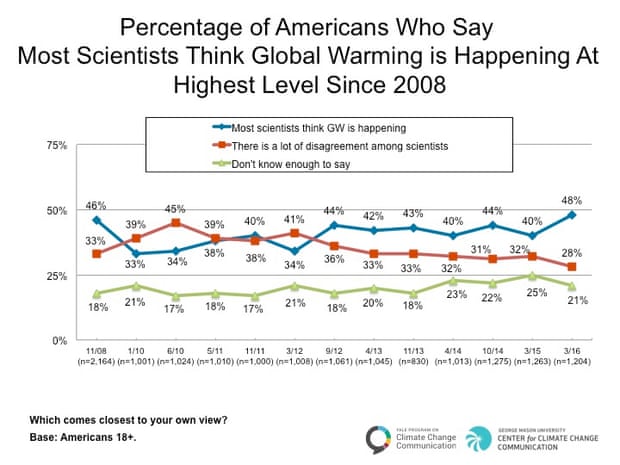
In 2013, a team of citizen science volunteers who collaborate on the climate myth debunking website SkepticalScience.com published a paper finding a 97% expert consensus on human-caused global warming in peer-reviewed research. Over the past 3 years, that paper has been downloaded more than 500,000 times. For perspective, that’s 4 times more than the second-most downloaded paper in the Institute of Physics journals (which includes Environmental Research Letters, where the 97% consensus paper was published).
The statistic reveals a remarkable level of interest for a peer-reviewed scientific paper. Over a three-year period, the study has been downloaded an average of 440 times per day, and the pace has hardly slowed. Over the past year, the download rate has remained high, at 415 per day.
The 97% study and other consensus research has been attacked and misrepresented, which led to a follow-up paper in which authors of seven previous climate consensus studies collaborated to settle the question once and for all. The two key conclusions from the paper were:
1) Depending on exactly how you measure the expert consensus, it’s somewhere between 90% and 100% that agree humans are responsible for climate change, with most of our studies finding 97% consensus among publishing climate scientists.
2) The greater the climate expertise among those surveyed, the higher the consensus on human-caused global warming.
That follow-up paper, published two months ago, has already been downloaded 45,000 times. Interestingly, the 2013 consensus paper has returned to the top spot as currently the most-read paper in Environmental Research Letters, with the 2016 follow-up study coming in second.
Those who want to preserve the status quo have continued to deny and attack the expert consensus because it’s a “gateway belief”: when people are aware of the high level of scientific agreement on human-caused global warming, they’re more likely to accept that climate change is happening, that humans are causing it, and support policies to reduce carbon pollution. As Republican strategist Frank Luntz said in an infamous memo leaked in 2003:
Voters believe that there is no consensus about global warming within the scientific community. Should the public come to believe that the scientific issues are settled, their views about global warming will change accordingly.
Therefore, you need to continue to make the lack of scientific certainty a primary issue in the debate.
Many contrarians have continued to follow this advice, and as a result, the public is still poorly misinformed about the magnitude of the expert consensus.
Social scientists have coined the term “consensus gap” to describe the large discrepancy between the actual 97% consensus, and the public perception that just half to two-thirds or experts agree on human-caused global warming. The consensus gap is likely a result of a concerted decades-long misinformation campaign by the fossil fuel industry, and false balance in media climate coverage.
However, since the publication of our 2013 paper, the consensus gap has modestly shrunk, and media coverage of the subject has become increasingly accurate.

Survey data asking Americans if most scientists think global warming is happening. Illustration: Yale Program on Climate Change Communication
While only 11% of Americans realize the expert consensus is above 90%, the percentage who realize that global warming is happening and human-caused is on the rise over the past several years.
Posted by dana1981 on Thursday, 23 June, 2016
 |
The Skeptical Science website by Skeptical Science is licensed under a Creative Commons Attribution 3.0 Unported License. |